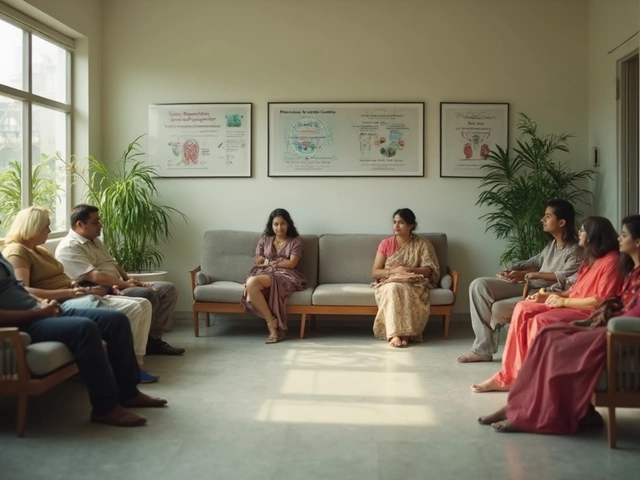The human heart, a marvel of biological engineering, sometimes requires intervention to keep it ticking optimally. When such a need arises, heart surgery can be a life-saving procedure. Yet, one common question on the minds of many patients and their families is how long they might expect such a surgery to last.
Understanding the duration of heart surgery involves more than just looking at the clock. It depends on a multitude of factors including the type of procedure and the patient's unique health condition. From transplants to bypasses, each type of surgery brings its own timeline.
In this article, we'll navigate the intriguing world of heart surgeries, unraveling the mysteries surrounding their duration. We'll touch upon factors that influence the length of surgery and provide insights that not only inform but also prepare anyone stepping into this journey.
- Understanding Heart Surgery
- Factors Influencing Surgery Time
- Common Types of Heart Surgeries
- Preparation and Recovery
- Interesting Facts
- Tips for Patients and Families
Understanding Heart Surgery
Heart surgery, a cornerstone in modern medicine, is an intricate dance between technology, expertise, and the human spirit. The journey begins long before the patient enters the operating room. It involves a meticulous process of diagnosis, planning, and preparation. The primary aim is often to correct or repair conditions affecting the heart's functioning. Conditions such as coronary artery disease, faulty heart valves, and arrhythmias among others, necessitate surgical interventions.
The complexity of heart surgeries ranges possibly more than any other type of surgical procedures. For instance, a coronary artery bypass grafting (CABG) might take anywhere from three to six hours. It requires delicately rerouting blood flow around a blocked artery to restore normal delivery of oxygen and nutrients to the heart muscle. On the other hand, a heart transplant, reserved for patients with end-stage heart failure, may stretch beyond seven hours. It demands replacing a patient's diseased heart with a healthy donor organ, a feat of precision and timing.
These operations are performed by a highly skilled team composed of surgeons, anesthetists, perfusionists, and operating room nurses. Each member plays a critical role, ensuring the procedure runs smoothly and efficiently. Let’s consider that the technology involved is nothing short of cutting-edge. Tools like the heart-lung machine, which takes over the job of circulating blood during surgery, are pivotal. They create a bloodless and motionless field, allowing surgeons the best conditions to operate effectively.
"Heart surgery has evolved into a precise art, blending science and innovation to give patients the best chance at recovery and improved quality of life." - Dr. Maria Sanchez, Cardiac Surgeon
It's crucial as well to understand that patients undergoing heart surgery are usually prepped days in advance with detailed consultations and preoperative testing. This helps in mapping out a personalized surgical plan, tailored to the individual's condition and any other health challenges they might face. The advancements in surgical techniques, diagnostic tools, and recovery protocols have significantly increased success rates. Reports suggest that surgeries like CABG have success rates over 95%, a testament to the dedicated research and continual improvements in the field.
Finally, it is important to note that the location and the surgeon's experience can influence the outcomes of heart surgery. High-volume centers often report better outcomes, attributed to the vast experience of their surgical teams. For patients, choosing the right place and the right surgeon can make all the difference, and it's worth doing some research to find out who the top experts in the field are.
Factors Influencing Surgery Time
When we dive into the specifics of how long heart surgery might take, the duration doesn't stand fixed across the board. One of the pivotal factors hinges on the type of procedure being carried out. Complex surgeries, such as heart transplants or complicated congenital heart defect repairs, often extend into longer hours compared to more routine operations like a coronary artery bypass, which typically may last between three to six hours. This variance stems from the intricacies involved in each procedure, the number of arteries involved, the method employed, and whether it's a first-time surgery or a repeat operation.
Next, we must consider the patient's overall health, which plays an instrumental role in determining the length of time on the operating table. Health conditions such as obesity, diabetes, or past surgeries can complicate a procedure, necessitating additional time for surgeons to work meticulously. Moreover, patients with a high body mass index may face extended times, as excess tissue can obscure visibility or prolong incision closures. Hence, the surgeon's expertise and the patient’s health condition intertwine to dictate the clock.
Another aspect that might seem mundane but is crucial is the pre-surgery preparation time. This phase begins with the anesthesia team as they ensure the patient is fully sedated and stable before the first incision. Depending on the patient’s medical history and the type of anesthesia used, achieving the correct levels of sedation and vital signs stability adds minutes, sometimes even hours, to the expected duration. What follows is the positioning of the patient, insertion of intravenous lines, and requisite monitoring technology, each step adding a layer of complexity that dictates time.
Dr. Christina Gentile, a renowned cardiac surgeon, emphasized, “The precise art of surgery should always prioritize patient safety over speed. It's not about racing against time but trusting the skill and rhythm of the surgical team.” These words echo the balancing act faced by surgical teams each day, marrying precision with time efficiency. It is a meticulous dance, where each step stem flows into the next, often taking unexpected turns along the choreography of surgery.
The medical team's proficiency cannot be overlooked. This includes not just the lead surgeon but the entire group from anesthetists to nurses and technicians. Each individual's skills and experience levels impact the flowing efficiency of a surgical operation. A seasoned team, familiar with each other’s methods and communication cues, can subtly shave minutes through seamless coordination. In contrast, less experienced teams might find themselves double-checking steps or operating with a more cautious pace, naturally extending the time spent in surgery.
Technology indeed guides modern surgeries. The availability and sophistication of surgical tools can notably affect the speed and efficiency of the operation. Robotic-assisted heart surgeries, for example, have been pivotal in reducing recovery times while enhancing precision. However, they also demand a preliminary setup and adjustment period that might extend the overall surgery time slightly. Table setup, system calibrations, and software checks all add to pre-operative waiting, demonstrating how technology, while enhancing outcomes, layers complexity that tags along time.

Common Types of Heart Surgeries
Heart surgeries come in different forms, each tailored to address specific cardiac issues. These procedures can vary significantly in duration and complexity, depending on the problem at hand. One of the most frequently performed heart surgeries is the coronary artery bypass grafting (CABG), or simply bypass surgery. This procedure typically takes between three to six hours, where blood flow is rerouted using a vein or artery from another part of the body. It's crucial to relieve symptoms in patients with severe coronary artery disease, often dramatically improving their quality of life. Bypass surgery is pivotal, especially for those who haven’t seen the desired results from other treatments such as lifestyle changes or medications.
Another common heart procedure is heart valve surgery, which involves repair or replacement of heart valves that manage the flow of blood through the heart. This surgery can last anywhere from two to five hours, depending on the valve involved and the type of repair needed. Valve surgeries are critical as they prevent backflow of blood and ensure that the heart operates efficiently. In recent years, minimally invasive techniques have been developed, leading to shorter recovery times and improved outcomes. However, traditional open-heart valve surgery remains necessary in some cases.
Then we have heart transplants, a more intricate operation that can often stretch beyond six hours. This life-saving procedure is essential for patients suffering from severe heart failure, where other treatments have fallen short. The demand for donor hearts continues to outstrip supply, and the procedure requires meticulous precision from highly skilled surgical teams. "The heart transplant is a prominent example of modern medicine's capabilities, offering a renewed life to those on the brink," states Dr. Ahmed Patel, a renowned cardiothoracic surgeon.
If we look at some innovative procedures, transcatheter aortic valve replacement (TAVR) stands out. This relatively new technique allows doctors to replace a narrowed aortic valve without removing the old, damaged one, through a catheter-based approach. This procedure typically lasts about 2-3 hours and provides an alternative to traditional open-heart surgery, especially for patients who are at higher risk with the conventional approach.
Recognizing the time commitment for these surgeries is essential, but so is understanding the reasons behind these procedures and the impact they have on patient lives. The field of cardiac surgery continues to evolve, with ongoing advancements aimed at reducing surgery time and enhancing recovery. Such progress signifies a beacon of hope for countless patients, offering them not just years to their life but life to their years.
Preparation and Recovery
When it comes to heart surgery, careful preparation is a key component of a successful outcome. Preparing for a heart surgery often begins weeks, sometimes months, in advance. A patient’s journey includes numerous consultations with cardiovascular surgeons, cardiologists, and anesthesiologists to meticulously assess one's heart condition and overall health. During these appointments, the medical team might discuss various heart surgery types, the specific procedure needed, and anticipated surgery duration. Blood tests, echocardiograms, and sometimes cardiac catheterization are part of this comprehensive evaluation process to tailor the upcoming surgery to the patient’s specific needs.
Beyond medical preparations, lifestyle changes are quintessential. Patients are often advised to cease smoking and reduce alcohol consumption to enhance recovery post-surgery. Engaging in light, regular exercise can increase the heart's strength, preparing it for the surgery ahead. Additionally, a healthy diet with adequate nutrition supports the body in its surgical healing process. Mental preparation, including understanding the nature of the heart surgery and its potential duration, helps patients feel less anxious and more in control. Coping strategies like meditation or speaking with a professional counselor can provide significant emotional support.
Recovery: The Road to Betterment
Once the heart surgery is complete, the recovery phase begins, which is just as important as the surgery itself. Recovery time varies, often depending on the complexity and duration of the surgery. The initial recovery phase typically occurs in the hospital’s intensive care unit, where a team of healthcare professionals monitors the patient’s progress closely. This period usually spans from one to three days, allowing the medical team to ensure the heart's steady rhythm and check for any immediate post-surgical complications.
The transition from hospital to home represents a shift in the recovery phase, usually lasting several weeks to months. Patients are encouraged to gradually resume daily activities while paying heed to their body’s signals. Regular follow-up appointments help ensure a smooth recovery journey. During these visits, doctors might adjust medications and assess the heart's recovery status. Adhering to prescribed physical therapy, aimed at strengthening the heart's capacity without overstressing it, forms a critical aspect of the recovery process.
"Recovery from heart surgery is more than just a physical journey—it's an emotional and mental transformation," says Dr. Michael Green, a leading cardiothoracic surgeon. "Understanding this helps patients and their families build the patience needed to navigate the path ahead."
Of notable interest in recovery is cardiac rehabilitation, a medically supervised program designed to improve cardiovascular health post-surgery. Patients who engage in such programs often witness a significantly reduced duration in their recovery timeline. A well-rounded recovery plan integrates not only physical health but also emotional and psychological well-being, optimizing the path back to daily life.

Interesting Facts About Heart Surgery
Heart surgery, a remarkable feat of modern medicine, holds a trove of fascinating facts that illuminate its complexity and historic strides in the medical field. Did you know that the first successful open-heart surgery was performed in 1953? It was only possible due to the invention of the heart-lung machine, a device that temporarily takes over the function of the heart and lungs during surgery. This breakthrough paved the way for more intricate procedures, revolutionizing cardiac care.
The intricacies of heart surgery involve not just the surgeon's skill but also an entire team working in symphony. The average team can include up to 10 highly skilled professionals ranging from surgeons to anesthesiologists and nurses specializing in cardiac care. Each plays a pivotal role, ensuring that every heartbeat is carefully monitored. The synchronization of this team is akin to that of an orchestra performing a delicate symphony.
According to Dr. Harvey Cushing, a pioneer in neurosurgery, "A physician is obligated to consider more than a diseased organ, more even than the whole man – he must view the man in his world." This holistic perspective is vital in heart surgery, where comprehensive patient care transcends the operating room.
Modern advancements have drastically reduced the risks associated with cardiac procedures. For instance, the use of robotic-assisted surgeries has increased precision, allowing for quicker recovery times. These robots do not replace the surgeon but enhance their capabilities, promising a future where incisions are minimal, and patient discomfort is significantly reduced. The emergence of minimally invasive techniques is quite promising for patients.
A remarkable 85% of heart bypass surgery patients survive 10 years post-operation, reflecting the effective improvement in cardiac operation outcomes. These surgeries, once considered perilous, now carry a survival rate that brings hope to millions globally. Even more interesting, the chances of longevity increase further when lifestyle adjustments accompany surgery, such as quitting smoking or adopting a heart-healthy diet full of fruits, vegetables, lean proteins, and whole grains.
The United States leads in the number of heart surgeries performed annually, with an estimated 500,000 coronary artery bypass grafting procedures executed each year. These numbers emphasize the importance and prevalence of heart surgery in tackling cardiovascular diseases. Innovations continue as we delve deeper into genetic research, aiming to foresee and prevent heart conditions before they necessitate surgery. This proactive approach is a growing trend in global healthcare strategies.
With statistics showcasing a dramatic drop in mortality related to heart surgeries over the last 30 years, it's comforting to note the upward trajectory in patient safety and surgical success. Indeed, the journey of heart surgery from its inception to the present day is a testament to human ingenuity and the relentless pursuit of medical progress.
Tips for Patients and Families
Stepping into the world of heart surgery can be daunting, not just for patients but also for their loved ones. One of the best ways to ease apprehension is by being well-prepared. Communication with healthcare providers is key; don’t shy away from asking your cardiac team about what to expect during the surgery duration as well as subsequent recovery. Keep in mind that every patient’s experience can vary, so personalizing your understanding based on your doctor's advice is crucial.
Preparation often starts weeks before the surgery date. Patients may be advised to adopt certain lifestyle changes such as quitting smoking or adjusting their diet. Families can support the patient by joining them in these changes, creating a supportive environment that encourages healthier habits. Additionally, it’s a good idea to schedule regular health check-ups in the days leading to the operation. This proactive approach can help identify and address any latent health concerns that might increase surgery time and bolster the chances of a smoother procedure and recovery.
Another tip involves logistical preparations—plan ahead for the hospital stay and post-surgery recovery. This means determining who will accompany the patient to the hospital, what personal items are needed, and arranging transportation for the return home. It’s also beneficial to designate a family member or a close friend as the primary contact person for updates from medical staff. This ensures that communication remains clear and organized. Loved ones can maintain a steady support system by taking turns to be with the patients, demonstrating emotional support that can significantly contribute towards a successful recovery.
Cope With Uncertainty and Stay Positive
The uncertainty regarding heart surgery can be overwhelming, but embracing a positive attitude can work wonders. Both patients and their families might find solace in the experiences of others who have undergone similar procedures. Online forums and support groups can provide invaluable insight and comfort through shared stories. A quote from Dr. Mehmet Oz, a notable heart surgeon, captures this sentiment:
"Hope is the only thing stronger than fear. The only time you really lose is when you don’t fight anymore. So fight your battles like it’s your last day and let your hope be stronger than your circumstances."
Encouraging open communication about feelings can help dispel fears. Attend pre-surgery consultations and consider jotting down questions in advance. Patients often find that understanding what happens during surgery helps quell anxiety. Post-operation, following a strict recovery regimen as advised by healthcare professionals is crucial. Let families play an active role by preparing patient-friendly meals, ensuring medications are taken on time, and creating a peaceful recovery space at home. These simple yet effective strategies can make a significant difference, facilitating the path from a successful cardiac operation to restored health.





